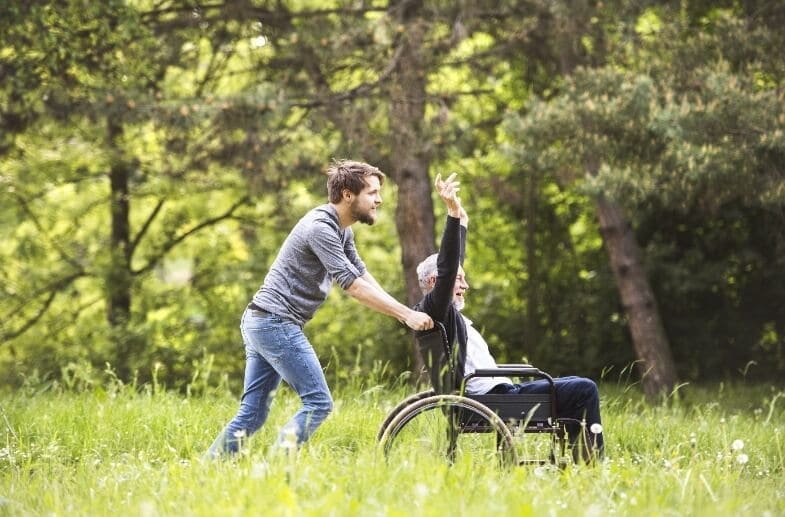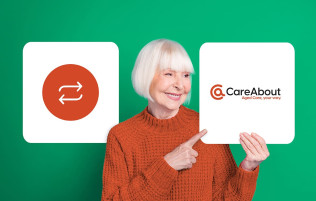Caregiving: what to expect

Are you about to take on a caregiving role? You’re probably feeling a little unsure about what to expect, or about what others might be expecting from you.
Choosing to care for someone is one of the most purposeful, generous and rewarding things you can do, however it isn’t always easy so it’s good to be prepared and to know what to expect.
There will undoubtedly be days where things are really challenging and where you might begin to question why you decided to take on a carer role. Firstly, if you do experience this, try not to place any blame on yourself or feel guilty – it’s okay to feel frustrated, angry, overwhelmed, or sad. This is an indicator that you need a break from your carer duties, so make sure you ask someone else to step in for a while – or use respite services if you don’t have the option of a known caregiver.
A key to being a great caregiver is to have your routine down to a tee! A good routine can help you to be thorough and attentive, yet efficient – giving you some extra time for yourself.
If you’re wondering what a caregiver does, or the duties you’re likely to encounter, here are 8 important and common caregiver duties.
1. First and foremost: make sure medical needs are looked after
As a caregiver, you should know the ins and outs of your loved ones medical needs. Before you do anything else, go with your loved one to their family GP (or specialist if they have one) and learn about any medical conditions they might have and how to monitor and manage them. If it’s been a while since your loved one had any regular tests and checkups, suggest that they do this too.
When you are caring for an older loved one, having regular medical checkups is important. Things can change quickly, so if you notice anything at all, it’s best to have it checked out immediately. Don’t wait or second guess yourself!
2. Medication
If your loved one has any regular medication, it’s likely that you’ll be keeping on top of what they are taking and when. It’s an easy thing to forget, so having a set time each day can help. In the early days when your routine isn’t yet familiar, setting an alarm or alert on your phone can be of great assistance! Pill boxes can also help you to organise multiple medications, and come in handy if you need to arrange different medication on different days.
3. Transport & shopping
Depending on your loved one’s mobility, you may be doing all of the shopping on behalf of them, or with them by your side. Either way, driving them to and from the shops and helping them to carry any bags or groceries will likely be a regular duty as a carer.
Once you’re home, unpacking the items and putting them away will be another task. Make sure you place frequently used items in an easy-to-access location and try not to stack items on top of one another as they could be knocked over and cause injury.
4. Personal care
Personal care duties are generally things such as:
- Assisting with showering and toileting
- Helping your loved one to get dressed, brush their hair, shave, put make-up on, or clean their teeth
Many older adults feel embarrassed that they require help with these personal daily living tasks and it isn’t uncommon to be faced with resistance, denial and even anger. Try to be patient if this happens, as it is a very big thing to lose one’s independence and to have to rely on somebody else.
You might find that your loved one will accept help from a stranger much more easily than from yourself, and many people choose to seek out a professional care worker for these personal care tasks.
If you’d like to explore this, CareAbout can match your loved one with a provider that will meet their needs and preferences.
5. Cleaning & gardening
A very common caregiver task is ensuring your loved one’s house stays clean and tidy. Cleaning duties can include doing the dishes, vacuuming, dusting, mopping, wiping down benchtops and other surfaces, cleaning the bathroom/s and toilet/s and ensuring that things in the house are kept tidy so that they aren’t a fall or trip hazard.
Mowing, weeding and pruning are additional tasks you’re likely to perform if your loved one has a front or back yard.
6. Social connections & participation
Many adults become increasingly isolated as they age and it is vital to keep up social activities and interactions. Loneliness and isolation lead to a range of health disorders and maintaining connectedness to others has a huge impact on physical and psychological wellbeing.
If your loved one has friends or family in their area, help them to meet up with and spend time with them. If they do not, there are many local community groups who run activities that you might like to get your loved one involved in.
7. Exercise & mobility
Another key piece to ageing well and maintaining physical and mental welling is exercise. Regular movement is key! Try to ensure that your loved one participates in some type of physical activity every day. Depending on their level of mobility, this could be going for a walk with you, helping you in the garden, or visiting the local pool for a swim or hydrotherapy class.
8. Preparing quality meals
Obtaining the right nutrition is another important factor for maintaining good health for as long as possible. We see a lot of older Aussies trying hard to stretch their finances and as a result, leave out a lot of key nutrients from their meals. This can lead to nutritional deficiencies and a whole host of subsequent health problems.
Preparing nutritious meals for your loved one is a key caregiver duty. You can cook many of these in advance and in bulk, freezing them for later when they are needed.
CareAbout is here to help!
Finally, if you need to, please ask for help, seek respite, and apply for a Home Care Package for your loved one as soon as you can! Save yourself time and uncertainty by speaking to one of our Care Advisers and get expert help at ZERO cost.








